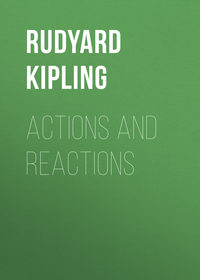Kitap dosya olarak indirilemez ancak uygulamamız üzerinden veya online olarak web sitemizden okunabilir.
Kitabı oku: «Actions and Reactions», sayfa 13
It was a disgraceful evening. To say we rioted through the house is to put it mildly. We played a sort of Blind Man’s Buff along the darkest passages, in the unlighted drawing-room, and little dining-room, calling cheerily to each other after each exploration that here, and here, and here, the trouble-had removed itself. We came up to the bedroom – mine for the night again – and sat, the women on the bed, and we men on chairs, drinking in blessed draughts of peace and comfort and cleanliness of soul, while I told them my tale in full, and received fresh praise, thanks, and blessings.
When the servants, returned from their day’s outing, gave us a supper of cold fried fish, M’Leod had sense enough to open no wine. We had been practically drunk since nightfall, and grew incoherent on water and milk.
“I like that Baxter,” said M’Leod. “He’s a sharp man. The death wasn’t in the house, but he ran it pretty close, ain’t it?”
“And the joke of it is that he supposes I want to buy the place from you,” I said. “Are you selling?”
“Not for twice what I paid for it – now,” said M’Leod. “I’ll keep you in furs all your life, but not our Holmescroft.”
“No – never our Holmescroft,” said Miss M’Leod. “We’ll ask him here on Tuesday, mamma.” They squeezed each other’s hands.
“Now tell me,” said Mrs. M’Leod – “that tall one, I saw out of the scullery window – did she tell you she was always here in the spirit? I hate her. She made all this trouble. It was not her house after she had sold it. What do you think?”
“I suppose,” I answered, “she brooded over what she believed was her sister’s suicide night and day – she confessed she did – and her thoughts being concentrated on this place, they felt like a – like a burning glass.”
“Burning glass is good,” said M’Leod.
“I said it was like a light of blackness turned on us,” cried the girl, twiddling her ring. “That must have been when the tall one thought worst about her sister and the house.”
“Ah, the poor Aggie!” said Mrs. M’Leod. “The poor Aggie, trying to tell every one it was not so! No wonder we felt Something wished to say Something. Thea, Max, do you remember that night?”
“We need not remember any more,” M’Leod interrupted. “It is not our trouble. They have told each other now.”
“Do you think, then,” said Miss M’Leod, “that those two, the living ones, were actually told something – upstairs – in your in the room?”
“I can’t say. At any rate they were made happy, and they ate a big tea afterwards. As your father says, it is not our trouble any longer – thank God!”
“Amen!” said M’Leod. “Now, Thea, let us have some music after all these months. ‘With mirth, thou pretty bird,’ ain’t it? You ought to hear that.”
And in the half-lighted hall, Thea sang an old English song that I had never heard before.
With mirth, thou pretty bird, rejoice
Thy Maker’s praise enhanced;
Lift up thy shrill and pleasant voice,
Thy God is high advanced!
Thy food before He did provide,
And gives it in a fitting side,
Wherewith be thou sufficed!
Why shouldst thou now unpleasant be,
Thy wrath against God venting,
That He a little bird made thee,
Thy silly head tormenting,
Because He made thee not a man?
Oh, Peace! He hath well thought thereon,
Therewith be thou sufficed!
THE RABBI’S SONG
IF THOUGHT can reach to Heaven,
On Heaven let it dwell,
For fear that Thought be given
Like power to reach to Hell.
For fear the desolation
And darkness of thy mind,
Perplex an habitation
Which thou hast left behind.
Let nothing linger after —
No whispering ghost remain,
In wall, or beam, or rafter,
Of any hate or pain:
Cleanse and call home thy spirit,
Deny her leave to cast,
On aught thy heirs inherit,
The shadow of her past.
For think, in all thy sadness,
What road our griefs may take;
Whose brain reflect our madness,
Or whom our terrors shake.
For think, lest any languish
By cause of thy distress
The arrows of our anguish
Fly farther than we guess.
Our lives, our tears, as water,
Are spilled upon the ground;
God giveth no man quarter,
Yet God a means hath found;
Though faith and hope have vanished,
And even love grows dim;
A means whereby His banished
Be not expelled from Him!
